Navigation
More options
You are using an out of date browser. It may not display this or other websites correctly.
You should upgrade or use an alternative browser.
You should upgrade or use an alternative browser.
East African Federation (EAF) public Views
- Thread starter nmkenda
- Start date
Dua
JF-Expert Member
- Nov 14, 2006
- 3,229
- 662
Kenya police shoot sect suspects
http://news.bbc.co.uk/go/pr/fr/-/2/hi/africa/6730187.stm


Kenyan police and paramilitary units are conducting a major crackdown on the illegal Mungiki sect in a slum in the capital city, Nairobi.

Mathare slum has been sealed off for a third day while they search for guns and sect members.

Armed police set their dogs on residents who fled while they conducted house-to-house searches.

And dozens of youths and women suspected to be members or sympathisers were bundled into police trucks and driven to police stations across Nairobi.

Police forced local people to lie on the ground as they made arrests and said they had shot dead at least 12 people on Thursday...

...after at least 21 suspected sect members were killed by police earlier this week.

The operation follows the discovery of several beheaded corpses in the Mathare slum and elsewhere in the country - blamed on Mungiki members.

Some of those brutally killed have included policemen.

The slum is seen as a stronghold of the Mungiki, a sect formed by ethnic Kikuyus, which runs protection rackets and claims links to top politicians.

Many residents have fled the Mathare slum

Kenyan police shot 12 Mungiki suspects on Thursday
Kenya slum turned into ghost town
http://news.bbc.co.uk/go/pr/fr/-/2/hi/africa/6731857.stm
The problem continues....................................................
Police in Kenya's capital, Nairobi, have shot 12 Mungiki suspects during a major crackdown on followers of the banned sect, a commander says. The police and paramilitaries have sealed off Mathare slum for a third day in a search for guns and sect members.
The BBC's Karen Allen at the scene says she saw several dead bodies being brought out of slum dwellings. Twenty-one people were killed by police in a shoot-out on Tuesday following the killing of two policemen on patrol.
"When we were arresting, some of them came out shooting. As we fired back, 12 were killed," police commander Paul Ruto told AP news agency.
Residents flee
The police operation comes a day after Security Minister John Michuki vowed to intensify operations against the sect.
Our reporter says she also saw about 40 people - including women and children - being forced by police to lie down in the mud as the operation continues.
Many residents have fled the Mathare slum, which is home to some 500,000 people and believed to be a Mungiki stronghold. A reporter for Reuters news agency said he saw an officer club a woman in the throat as she clutched a baby.
Earlier, Mungiki members threatened to behead more people. Albert Kimanthi, the police chief in Muranga district north of Nairobi, confirmed that threatening leaflets authored by the sect members were circulating in the area. The Mungiki warn that unless residents and traders pay protection fees, they will behead 20 people.
The sect is accused of beheading more than a dozen people in the capital and parts of the central province, in the past three months.
"We assure the residents that we have beefed up security in the area and will counter the sect effectively," Mr Kimanthi told reporters in Muranga.
The leaflets ask transport operators, small businesses and homesteads to pay between $1 and $3 as a daily protection fee.
Mr Michuki, who chaired a meeting with leaders from the most affected areas, said they all support a merciless campaign against the Mungiki.
Last week, the president warned that Mungiki activities would no longer be tolerated and ordered a shoot-to-kill policy.
The Mungiki are thought to be militants from Kenya's biggest ethnic group, the Kikuyu.
Some commentators have linked them to politicians wanting to cause unrest and fear ahead of December elections. The sect promotes female circumcision and oath-taking and was outlawed in 2002.
http://news.bbc.co.uk/go/pr/fr/-/2/hi/africa/6730187.stm
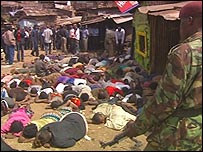
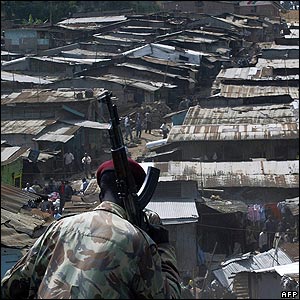
Kenyan police and paramilitary units are conducting a major crackdown on the illegal Mungiki sect in a slum in the capital city, Nairobi.
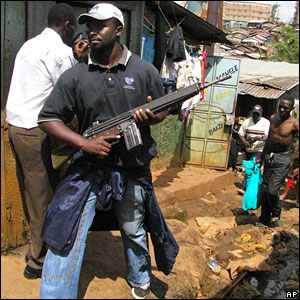
Mathare slum has been sealed off for a third day while they search for guns and sect members.
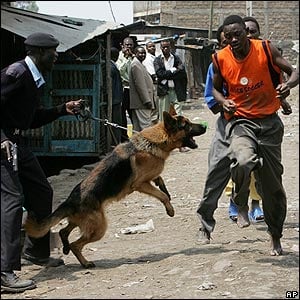
Armed police set their dogs on residents who fled while they conducted house-to-house searches.
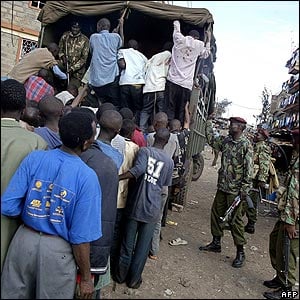
And dozens of youths and women suspected to be members or sympathisers were bundled into police trucks and driven to police stations across Nairobi.
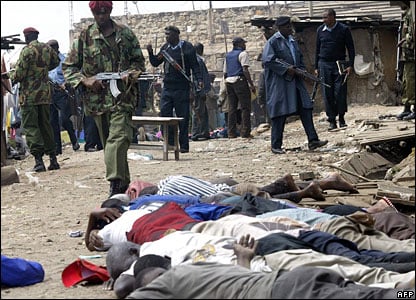
Police forced local people to lie on the ground as they made arrests and said they had shot dead at least 12 people on Thursday...
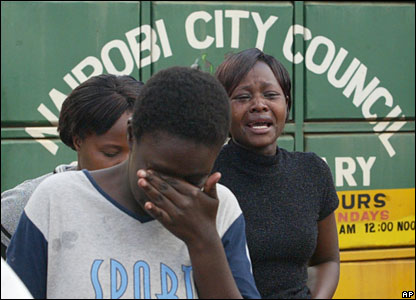
...after at least 21 suspected sect members were killed by police earlier this week.
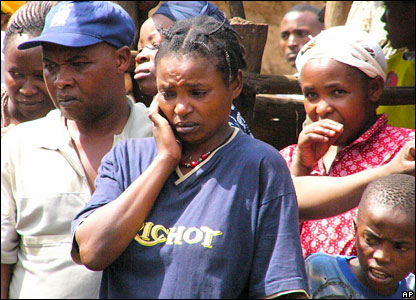
The operation follows the discovery of several beheaded corpses in the Mathare slum and elsewhere in the country - blamed on Mungiki members.
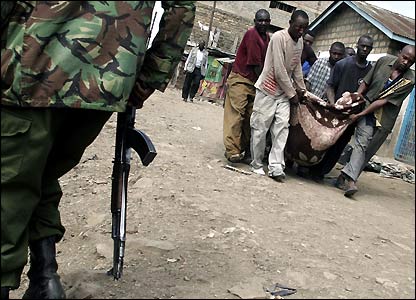
Some of those brutally killed have included policemen.
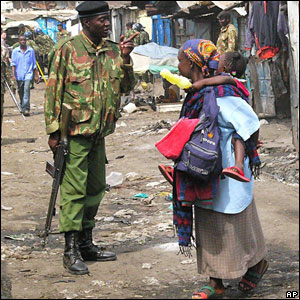
The slum is seen as a stronghold of the Mungiki, a sect formed by ethnic Kikuyus, which runs protection rackets and claims links to top politicians.
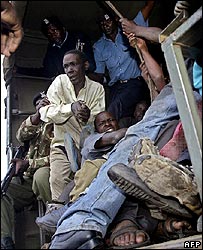
Many residents have fled the Mathare slum
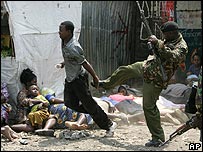
Kenyan police shot 12 Mungiki suspects on Thursday
Kenya slum turned into ghost town
The sprawling Mathare slum in the Kenyan capital, Nairobi, home to nearly half a million people has been transformed into a near ghost town.
Many residents have fled their homes following a three-day operation by police and paramilitary unit searching for adherents of the outlawed Mungiki sect in the maze of dirt roads and wooden shacks.
Dozens of youths and women suspected to be members or sympathisers of the banned sect were bundled into police trucks and driven to police stations across the city for interrogation. More than 30 people have been killed during shoot-outs with police in Mathare this week after two policemen were killed and their guns stolen.
Mathare is believed to be a stronghold of the Mungiki.
'Difficult to identify'
Heavily armed police have been breaking doors and dragging out people from their homes during a hunt for guns and Mungiki followers.
"We know that Mungiki people live here in the slum but it is difficult to identify them," Mathare resident Kamau Njuguna told the BBC.
Police have been ordering people to kneel or lie on the muddy ground before frisking them for weapons and illicit drugs.
"I really regret living in the slums, we have been beaten thoroughly by police just for asking questions and we are not Mungiki followers," said Moses Omondi. The police have also demolished several shacks, as they look for weapons, hauls of cannabis and home-made alcohol brew, a common merchandise in Mathare and other slums in Nairobi.
Dismantled
"Please don't destroy my house, please give me two days to leave the country," pleaded Wanasolo William, 30, originally from Uganda, as police knocked down his shack made from wood and iron sheeting.
But a police officer said the houses had to be dismantled in the search for evidence.
"We have recovered a G-3 rifle and rounds of ammunitions and we believe this is one of our guns," Paul Ruto, the officer leading the operation told the BBC News website. They also arrested a woman living in the house where the rifle was recovered but she denied having anything to do with it.
"I do not know where it came from, my husband works at a restaurant in town and I work in a salon in town. I am innocent, please do not arrest me," pleaded the middle-aged woman, as the police frog-marched her to a waiting van.
Deputy police commissioner Lawrence Mwadime says the force is experiencing problems because the slum dwellers are not ready to volunteer information. "They do not want to volunteer vital information and we believe some are harbouring the criminals so we have to use our skills to get the suspects," Mr Mwadime told reporters.
http://news.bbc.co.uk/go/pr/fr/-/2/hi/africa/6731857.stm
The problem continues....................................................
DAR si LAMU
JF-Expert Member
- Mar 31, 2007
- 2,928
- 544
....ukandamizaji uliokithiri katika jamii.....walafi kula peke yao bila kujali kama kuna wenzao wenye njaa kama wao na matumboni hawajatulia!
hiyo ni moja ya mfano wa failure ya system ku-deliver kwa wananchi.
halafu hawa wata-deliver kwa mambo ya siasa kweli?[si kwamba si tu wasafi,ila inatisha huko]
hiyo ni moja ya mfano wa failure ya system ku-deliver kwa wananchi.
halafu hawa wata-deliver kwa mambo ya siasa kweli?[si kwamba si tu wasafi,ila inatisha huko]
Hivo vijibanda Duuuuuuuu
viko Jijini Nairobi,ebwana wee Kenya kama ni hivo ni choka mbaya,
sasa strongest nation in region kweli ni kenya???
au wana statitics inakuaje? hapo
Maana inaonekana Masikini wa kenya ni choka mbaya sanaaaaa na wenda akawa ameshakata tamaa na maisha na kuamua kuwa Mungiki kutokana na taabu na mateso.
wewe zichungulie hizo picha harafu ufikirie zipo Nairobi
Federation BIG NO
viko Jijini Nairobi,ebwana wee Kenya kama ni hivo ni choka mbaya,
sasa strongest nation in region kweli ni kenya???
au wana statitics inakuaje? hapo
Maana inaonekana Masikini wa kenya ni choka mbaya sanaaaaa na wenda akawa ameshakata tamaa na maisha na kuamua kuwa Mungiki kutokana na taabu na mateso.
wewe zichungulie hizo picha harafu ufikirie zipo Nairobi
Federation BIG NO
Invisible
Robot
- Feb 11, 2006
- 9,075
- 7,878
Nurujamii,
Shukrani lakini hiyo kitu ilishawekwa hapa tangia wiki jana na link location yake ni hii (Bofya uone yaliyoongelewa kwenye Siasa): - Great Stuff
Shukrani lakini hiyo kitu ilishawekwa hapa tangia wiki jana na link location yake ni hii (Bofya uone yaliyoongelewa kwenye Siasa): - Great Stuff
calvinelias
New Member
- Apr 5, 2007
- 4
- 0
Truly, not all states are equal when viewed on an economic or political paradigm. But the solutions lie in addressing the weakness collectively rather than individually or in wasting time on self-defeating excuses therefore we should look ahead to the vast opportunities that an East African federation can open up.
Dua
JF-Expert Member
- Nov 14, 2006
- 3,229
- 662
Burundians return home to landlessness
Unaweza kusoma full story hapa
Sasa ndio tunaona hiyo federation ni kukimbilia ardhi ambayo kila siku walikuwa wanasema siyo sababu Kenya wana shida hiyo pia.
Internally displaced people and returnees are concerned about access to heathcare, water, sanitation, food and schooling for their children.......................................................................................................
Not everyone is, however, applauding. Most of the returnees have found they lack one vital life-sustaining tool: suitable land.
"We live in very poor conditions here. We have to beg from the local communities just to survive," Moise Barekezabe, who also acts as the chief in a camp in the commune of Rukaramu, said. .................................
There are at least 350,000 Burundian refugees in Tanzania and another 17,000 in the Democratic Republic of Congo (DRC). It is expected that most will return home, compounding the land pressure. ......................................
Unaweza kusoma full story hapa
Sasa ndio tunaona hiyo federation ni kukimbilia ardhi ambayo kila siku walikuwa wanasema siyo sababu Kenya wana shida hiyo pia.
Dua
JF-Expert Member
- Nov 14, 2006
- 3,229
- 662

Mrs Beckett and Mr Blair will attend the EU summit in Brussels
UK 'prepared to block EU treaty'
The UK will block any unsatisfactory deal in this week's EU treaty negotiations, Foreign Secretary Margaret Beckett has said. She told MPs that "the UK government is clear... no deal is better than buying any old pig in a poke". There were "significant differences" between nations on what should replace the aborted constitution, she said.
Prime Minister Tony Blair has said he will not compromise in areas including foreign policy and tax and benefits. On Monday, Mr Blair listed four so-called "red lines" that the UK government would not cross, also including a Charter of Fundamental Rights and EU-wide legislation on common law.
Mrs Beckett told the House of Commons: "We want an EU that takes action where it's needed on issues like climate security, economic reform or energy and leaves national government in charge of key areas including taxes, foreign policy, defence and their domestic economy."
The government says it will not agree to any treaty that would require a referendum but the Conservatives say the transfer of any power to the EU would require a public vote. The summit on Thursday and Friday is expected to go to the wire as the 27 member states wrangle over how much of the constitution rejected by voters in France and Holland in 2005 should be revived.
"The people of those countries have spoken and the leaders of Europe have to take heed," Mrs Beckett said.
Constitution elements
Shadow foreign secretary William Hague said the government should have argued for a different kind of union following the rejection of the constitution. But it had "buried its head in the sand", he said, allowing the onstitution to re-emerge under a different name.
Germany, which holds the rotating EU presidency, has aimed to put core elements of the aborted constitution at the heart of a new agreement.
Meanwhile France and Spain have proposed a 10-point document backing an expansion of EU powers. Greater integration had "never been the wish of the people of the UK", Mr Hague said. He added: "If there is a new treaty, we are clear there must be a referendum."
Soma hapa
Sisi Tanzania VETO yetu iko wapi kwenye EAC?
watanzania tunatakiwa tuwe waangalifu kuhusu hili suala la shirikisho. Kwa upande wangu naona si wakati muafaka sasa hivi. Tuna tofauti nyingi mno, kiuchumi, kiitikadi, hali ya usalama, kielimu n.k. Tusikimbilie kuiga wenzetu wa jumuiya ya Ulaya wamekomaa kisiasa. wanaweza kuambizana ukweli. sisi huku bado kuna kuogopana hivyo utakuta rais ambaye ana ubabe kama Musevereni akaishia kudictake issues kwa our "handsome" rais ambaye yeye bado haya masuala hayajampanda kichwani vizuri. Chonde tusiuze hali ya usalama na utulivu tulionao.
Alai
Member
- May 10, 2007
- 71
- 5
Mkapas brush with bad karma
During his term in office, the former Tanzanian president led a campaign to 'de-Tanzanianise' publisher Jenerali Ulimwengu, who it was claimed was Malawian. Now there are allegations that Mkapa is in fact a Mozambican. PHILIP OCHIENG', recalling the days when he, Mkapa and Ulimwengu all worked together at the Daily News, draws the moral lessons from this tale
THE ANCIENT TEACHERS HAD A FITTING moral rule for Benjamin Mkapa: Do unto others as you would have them do unto you; or, the other way round: Never do to anybody anything you would not want him to do to you. Both the Buddha and the Christ are reported to have admonished: Never condemn or punish anybody for a sin that you yourself commit.
It is difficult to see what his detractors hope to achieve so late in the former presidents life by charging that he is not a Tanzanian. According to reports reaching me from Dar es Salaam, the charge is getting thicker by the day that he is a Mozambican.
A surprising number of Tanzanians have fallen into this ethnic Eldama Ravine. When I worked in Dar, in the early 1970s, Tanzania looked like the only African country completely free of tribalism the virus that has eaten so destructively into Kenyas body politic.
But if Ben now finds himself a target of it, it does unfortunately look like a fitting comeuppance. For, not so long ago during his years at Ikulu (State House) he reportedly led the way by spearheading a determined campaign to de-Tanzanianise a mutual friend, saying that our friends parents had come from the other side of Lake Tanganyika.
Even at the personal level, I found it most painful, because I once worked very closely with Jenerali Ulimwengu and Benjamin Mkapa under the direction of what is probably the broadest mind I have ever known among the worlds practising politicians. I mean Mwalimu Julius Kambarage Nyerere.
Ben was our managing editor when I wrote a highly critical column called The Way I See It for a government-owned newspaper originally known as The Tanganyika Standard. This Dar es Salaam Standard had been part of a huge East African newspaper conglomerate owned by Roland Tiny Rowlands Lonrho.
Nairobis own East African Standard which had for a long time been a mouthpiece of Kenyas diehard British colonial settlers was its flagship. Its satellites included The Argus of Kampala, The Times of Zambia, The Mombasa Times and a Nairobi-based Kiswahili periodical called Baraza.
IN 1970, WHEN MWALIMU NATIONALISED The Tanganyika Standard, he renamed it The Standard Tanzania. But, in 1972, it was merged with The Nationalist, which had been the organ of the ruling party Tanu since nationalist times, to give birth to the present Daily News.
Benjamin Mkapa, one of the keenest minds I have ever worked with, was always central to these changes indeed, to Tanzanias entire information system. He was always to Nyereres right, to be sure, and never indulged in the revolutionary phrase-mongering that went on in Tanzania at that time.
But one thing I must say. Bens manner was always polished, his mind always remarkably cosmopolitan. His capacity for tolerance was shown by the fact that he allowed all nuances of political thought from sixth-lane right-wing reaction to Trotskyite leftism to be expressed fully through the newspapers that he edited.
AND, ALTHOUGH BEN WAS firm in the implementation of the editorial policies that Mwalimu had laid down for The Standard when he took it over, I never detected any arrogance of power, and not a single whiff of ethnic or national narrowness, in Bens leadership.
His amiable personality, and Nyereres, probably contributed to the disproof of a deeply held Western prejudice that a newspaper can serve society fully, objectively and with impartiality only if it is independent of all government influences. Clearly, it depends also on what kind of government is in place.
But the upshot is that, thanks to the policy guidelines that Mwalimu issued, The Standard Tanzania for which I worked (successively under Frene Ginwala, Sammy Mdee, Ben Mkapa and Ferdinand Ruhinda) was probably the freest newspaper that I have ever known. Probably Bens moral and intellectual attributes were inborn. But he must owe much to his formal intellectual upbringing. It is hard to imagine he didnt go to Tabora Boys Government Secondary School, Tanganyikas equivalent of Kenyas Alliance High School and Ugandas Kings College, Budo. Most of Tanzanias prominent leaders at that time including Mwalimu were Tabora products.
Instead, he went to Ndanda Secondary School and St. Francis College, Pugu. Ben then took a degree in English from Kampalas Makerere that eras tertiary concentration of East Africas intellectual elite where he was a classmate of such potent minds from Kenya as the novelist Ngugi wa Thiongo, the poet Jonathan Kariara and the literature don Grant Kamenju.
On returning from New York Citys Columbia University with a masters in English, Ben started life as a speech writer for Oscar Kambona, the partys secretary-general who, at Independence, became the foreign minister, probably the most brilliant of the stars rising in the Haven of Peace.
However, following Azimio the Arusha Declaration of 1967 Kambona rebelled against Nyerere over the documents Ujamaa policy, especially the imposition of a stringent code of conduct barring a certain echelon of party and government leaders from private business.
Kambona dashed into exile in London, from where, in the beginning, he gave Nyerere quite a run for his money in terms of propaganda, but where he gradually wasted away into national oblivion. By the time he returned home, in the 1980s, he had lost all steam and died soon afterwards.
BUT, BACK IN THE MID-60S, it was Kambona who arranged for Ben Mkapa to be appointed the editor of The Nationalist, assisted by such able journalists and dedicated wazalendo (patriots) as Costa Kumalija and Ferdinand Ruhinda. It would never at that time have occurred to any Tanzanian to mention the link.
But Kambona and Ben had something in common that may shed light on what is happening to Ben today. If the question of ones tribe had been as paramount in Tanzanias national mind as it remains in Kenyas today, Kambona would have been accused of tribalism.
For both he and Mkapa were said to belong to the Ngoni community. Rashidi Kawawa, the redoubtable colonial-era trade unionist who was later to become even more powerful as prime minister, was also said to be a Ngoni. The thing about that ethnic community is its omnipresence in the southern half of the continent.
In his book A History of the African People, Robert W. July, an American historian, traces the Ngoni all the way to the Zulu of Natal and reports that, today, they are to be found in Botswana, Lesotho, Malawi, Mozambique, Swaziland, Tanganyika (mainland Tanzania), Zambia and Zimbabwe.
Kambonas roots were claimed to be either in Malawi or Mozambique. So were those of Austin Shaba and Michael Kamaliza. The latter was a powerful trade unionist (with close links with Kenyas Tom Mboya). Both were close allies of Kambona in Nyereres first Cabinet, and both petered out with him.
But that is where the question arises. What does it matter if Ben Mkapa has this South African link? What does it matter that like the denizens of Mombasas Kisauni Kambonas people came from Malawi? What does it matter if Jeneralis great grandparents were Rwandese or Congolese?
In the first place, every last one of Africas international boundaries is completely artificial. All were drawn up totally arbitrarily by European powers following the partition conference in Berlin in 1885. The Maasai, for instance, were divided into two, half going to Kenya and half to Tanganyika.
THAT IS WHY TWO BROTHERS called Awori may one day become presidents simultaneously, Moody in Kenya and Aggrey in Uganda. Jeneralis family may have been sundered in a similar manner, some going to Belgian Congo, some to Belgian Rwanda, and some to German Tanganyika.
Every African country has that problem and it is the cause of all our secessionist movements, which, if allowed, would as Kwame Nkrumah pointed during the formation of the Organisation of African Unity in Addis Ababa in 1963 logically culminate in puny little tribal states.
But, secondly, even before Europes advent, tribes and races like human beings all over the world were moving into and out of Africa, back and forth, all over. That is why the Hottentots of South Africa and the Malagasy of Madagascar have such prominent Mongoloid (Indonesian) features.
Indians, Arabs and Shirazis (Iranians) were settling along the East African littoral a millennium and half before my Luo people arrived in Nyanza from the Sudan or the Kikuyu in the Mount Kenya region from Mozambique.
In his remarkable book The Kalenjin Peoples Egypt Origin Legend Revisited: Was Isis Assis? sub-titled A Study in Comparative Religion Kipkoech arap Sambu shows that the Kalenjin arrived in East Africa from Nilotic North Africa. Indeed, we can say that their cousins, the Maasai, are Kenyas only true autochthons.
So neither Mwai Kibaki nor Raila Odinga nor Musalia Mudavadi nor Musikari Kombo nor Uhuru Kenyatta nor William Ruto nor Kalonzo Musyoka nor Ali Mwakwere nor Joe Khamisi can claim that he is more Kenyan than Davinder Lamba, Ali Mazrui, Najib Balala and Pheroze Nowrojee or, for that matter, Richard Leakey and even the hapless scion of Lord Delamere.
That is the point. If you pose the question: Who is a Tanganyikan? the answer has to be: every tribe and race which was covered by the Berlin treaty that created Tanganyika, and everybody else whom the vicissitudes of history brought into that country who satisfies all other legal citizenship requirements.
That is why neither Jakaya Kikwete nor Kingunge Ngombale-Mwiru nor Chief Abdalla Fundikira nor Pius Msekwa nor Mark Bomani nor Bhoke Munanka nor Anna Tibaijuka can claim that he or she is more Tanzanian than Salim Ahmed Salim, Zakia Meghji, Timothy Apiyo and Joseph Mungai.
That is why Ben Mkapa should have left Twaha Jenerali Ulimwengus given name well alone. But that is also why Tanzanians should leave Ben Mkapa himself alone. Not only are both fully Tanzanian but also both have served the people of that country in very senior capacities.
Jenerali, who now publishes his own newspaper, was the one to whom I bequeathed my Daily News column when I left Tanzania in 1973. Afterwards, he served Tanu later rechristened Chama cha Mapinduzi in various senior capacities, including for many years as its envoy to a continental youth organisation based in Algiers.
When The Nationalist was merged with The Standard Tanzania to create the Daily News, Ben replaced Mdee as its editor. He then served for a number of years as Tanzanias diplomatic envoy first in Ottawa and then in Washington, before being named foreign minister. Benjamin William Mkapa was on his way to Ikulu.
I had occasion to criticise some other aspects of his government, especially corruption and, more recently, Tanzanias un-Nyerere-like surrender to the predatory global power structure. Official Dar es Salaams reaction to my criticism was remarkable for its cowardice.
Instead of replying through the newspaper in which I had written it, Dar simply organised a few Kiswahili rags in Dar to pour uneducated insults on my name. It was not behaviour that Julius Nyerere would have applauded. It was a far cry from Mwalimus 1967 injunction to us: Argue, dont shout!
What had happened to the open and firm but positive, friendly and good-mannered freedom of opinion and criticism which I had enjoyed successively under Frene, Sammy, Ferdinand and, above all, Ben Mkapa himself? What unalloyed fun it was!
COULD IT BE THAT SUCH SENIOR Dar colleagues of mine as Tony Barros, Immanuel Bulugu, Felix Kaiza, Kusai Kamisa, Fili Karashani, Naijuka Kasihwaki, Scholastica Kimaryo, Hadji Konde, Guido Magome, Joseph Mapunda, Khassim Mpenda, Nsubisi Mwakipunda, Ulli Mwambulukutu, Adarsh Nayar, Abdalla Ngororo, Robert Rweyemamu and Pascal Shija were the ones now pouring such bilge water on me?
I dont know. But one thing is certain. When Ben Mkapa was editing an authoritative newspaper, Tanzania was the African nation most conscious of its objective interests and, at the same time, most committed to mankinds liberation, especially Africas.
When Benjamin William Mkapa was the chief policy custodian of the Indian Ocean city, Tanzania seemed to lose that international leadership role which once made Dar es Salaam the moral and intellectual capital of the world. What happened?
During his term in office, the former Tanzanian president led a campaign to 'de-Tanzanianise' publisher Jenerali Ulimwengu, who it was claimed was Malawian. Now there are allegations that Mkapa is in fact a Mozambican. PHILIP OCHIENG', recalling the days when he, Mkapa and Ulimwengu all worked together at the Daily News, draws the moral lessons from this tale
THE ANCIENT TEACHERS HAD A FITTING moral rule for Benjamin Mkapa: Do unto others as you would have them do unto you; or, the other way round: Never do to anybody anything you would not want him to do to you. Both the Buddha and the Christ are reported to have admonished: Never condemn or punish anybody for a sin that you yourself commit.
It is difficult to see what his detractors hope to achieve so late in the former presidents life by charging that he is not a Tanzanian. According to reports reaching me from Dar es Salaam, the charge is getting thicker by the day that he is a Mozambican.
A surprising number of Tanzanians have fallen into this ethnic Eldama Ravine. When I worked in Dar, in the early 1970s, Tanzania looked like the only African country completely free of tribalism the virus that has eaten so destructively into Kenyas body politic.
But if Ben now finds himself a target of it, it does unfortunately look like a fitting comeuppance. For, not so long ago during his years at Ikulu (State House) he reportedly led the way by spearheading a determined campaign to de-Tanzanianise a mutual friend, saying that our friends parents had come from the other side of Lake Tanganyika.
Even at the personal level, I found it most painful, because I once worked very closely with Jenerali Ulimwengu and Benjamin Mkapa under the direction of what is probably the broadest mind I have ever known among the worlds practising politicians. I mean Mwalimu Julius Kambarage Nyerere.
Ben was our managing editor when I wrote a highly critical column called The Way I See It for a government-owned newspaper originally known as The Tanganyika Standard. This Dar es Salaam Standard had been part of a huge East African newspaper conglomerate owned by Roland Tiny Rowlands Lonrho.
Nairobis own East African Standard which had for a long time been a mouthpiece of Kenyas diehard British colonial settlers was its flagship. Its satellites included The Argus of Kampala, The Times of Zambia, The Mombasa Times and a Nairobi-based Kiswahili periodical called Baraza.
IN 1970, WHEN MWALIMU NATIONALISED The Tanganyika Standard, he renamed it The Standard Tanzania. But, in 1972, it was merged with The Nationalist, which had been the organ of the ruling party Tanu since nationalist times, to give birth to the present Daily News.
Benjamin Mkapa, one of the keenest minds I have ever worked with, was always central to these changes indeed, to Tanzanias entire information system. He was always to Nyereres right, to be sure, and never indulged in the revolutionary phrase-mongering that went on in Tanzania at that time.
But one thing I must say. Bens manner was always polished, his mind always remarkably cosmopolitan. His capacity for tolerance was shown by the fact that he allowed all nuances of political thought from sixth-lane right-wing reaction to Trotskyite leftism to be expressed fully through the newspapers that he edited.
AND, ALTHOUGH BEN WAS firm in the implementation of the editorial policies that Mwalimu had laid down for The Standard when he took it over, I never detected any arrogance of power, and not a single whiff of ethnic or national narrowness, in Bens leadership.
His amiable personality, and Nyereres, probably contributed to the disproof of a deeply held Western prejudice that a newspaper can serve society fully, objectively and with impartiality only if it is independent of all government influences. Clearly, it depends also on what kind of government is in place.
But the upshot is that, thanks to the policy guidelines that Mwalimu issued, The Standard Tanzania for which I worked (successively under Frene Ginwala, Sammy Mdee, Ben Mkapa and Ferdinand Ruhinda) was probably the freest newspaper that I have ever known. Probably Bens moral and intellectual attributes were inborn. But he must owe much to his formal intellectual upbringing. It is hard to imagine he didnt go to Tabora Boys Government Secondary School, Tanganyikas equivalent of Kenyas Alliance High School and Ugandas Kings College, Budo. Most of Tanzanias prominent leaders at that time including Mwalimu were Tabora products.
Instead, he went to Ndanda Secondary School and St. Francis College, Pugu. Ben then took a degree in English from Kampalas Makerere that eras tertiary concentration of East Africas intellectual elite where he was a classmate of such potent minds from Kenya as the novelist Ngugi wa Thiongo, the poet Jonathan Kariara and the literature don Grant Kamenju.
On returning from New York Citys Columbia University with a masters in English, Ben started life as a speech writer for Oscar Kambona, the partys secretary-general who, at Independence, became the foreign minister, probably the most brilliant of the stars rising in the Haven of Peace.
However, following Azimio the Arusha Declaration of 1967 Kambona rebelled against Nyerere over the documents Ujamaa policy, especially the imposition of a stringent code of conduct barring a certain echelon of party and government leaders from private business.
Kambona dashed into exile in London, from where, in the beginning, he gave Nyerere quite a run for his money in terms of propaganda, but where he gradually wasted away into national oblivion. By the time he returned home, in the 1980s, he had lost all steam and died soon afterwards.
BUT, BACK IN THE MID-60S, it was Kambona who arranged for Ben Mkapa to be appointed the editor of The Nationalist, assisted by such able journalists and dedicated wazalendo (patriots) as Costa Kumalija and Ferdinand Ruhinda. It would never at that time have occurred to any Tanzanian to mention the link.
But Kambona and Ben had something in common that may shed light on what is happening to Ben today. If the question of ones tribe had been as paramount in Tanzanias national mind as it remains in Kenyas today, Kambona would have been accused of tribalism.
For both he and Mkapa were said to belong to the Ngoni community. Rashidi Kawawa, the redoubtable colonial-era trade unionist who was later to become even more powerful as prime minister, was also said to be a Ngoni. The thing about that ethnic community is its omnipresence in the southern half of the continent.
In his book A History of the African People, Robert W. July, an American historian, traces the Ngoni all the way to the Zulu of Natal and reports that, today, they are to be found in Botswana, Lesotho, Malawi, Mozambique, Swaziland, Tanganyika (mainland Tanzania), Zambia and Zimbabwe.
Kambonas roots were claimed to be either in Malawi or Mozambique. So were those of Austin Shaba and Michael Kamaliza. The latter was a powerful trade unionist (with close links with Kenyas Tom Mboya). Both were close allies of Kambona in Nyereres first Cabinet, and both petered out with him.
But that is where the question arises. What does it matter if Ben Mkapa has this South African link? What does it matter that like the denizens of Mombasas Kisauni Kambonas people came from Malawi? What does it matter if Jeneralis great grandparents were Rwandese or Congolese?
In the first place, every last one of Africas international boundaries is completely artificial. All were drawn up totally arbitrarily by European powers following the partition conference in Berlin in 1885. The Maasai, for instance, were divided into two, half going to Kenya and half to Tanganyika.
THAT IS WHY TWO BROTHERS called Awori may one day become presidents simultaneously, Moody in Kenya and Aggrey in Uganda. Jeneralis family may have been sundered in a similar manner, some going to Belgian Congo, some to Belgian Rwanda, and some to German Tanganyika.
Every African country has that problem and it is the cause of all our secessionist movements, which, if allowed, would as Kwame Nkrumah pointed during the formation of the Organisation of African Unity in Addis Ababa in 1963 logically culminate in puny little tribal states.
But, secondly, even before Europes advent, tribes and races like human beings all over the world were moving into and out of Africa, back and forth, all over. That is why the Hottentots of South Africa and the Malagasy of Madagascar have such prominent Mongoloid (Indonesian) features.
Indians, Arabs and Shirazis (Iranians) were settling along the East African littoral a millennium and half before my Luo people arrived in Nyanza from the Sudan or the Kikuyu in the Mount Kenya region from Mozambique.
In his remarkable book The Kalenjin Peoples Egypt Origin Legend Revisited: Was Isis Assis? sub-titled A Study in Comparative Religion Kipkoech arap Sambu shows that the Kalenjin arrived in East Africa from Nilotic North Africa. Indeed, we can say that their cousins, the Maasai, are Kenyas only true autochthons.
So neither Mwai Kibaki nor Raila Odinga nor Musalia Mudavadi nor Musikari Kombo nor Uhuru Kenyatta nor William Ruto nor Kalonzo Musyoka nor Ali Mwakwere nor Joe Khamisi can claim that he is more Kenyan than Davinder Lamba, Ali Mazrui, Najib Balala and Pheroze Nowrojee or, for that matter, Richard Leakey and even the hapless scion of Lord Delamere.
That is the point. If you pose the question: Who is a Tanganyikan? the answer has to be: every tribe and race which was covered by the Berlin treaty that created Tanganyika, and everybody else whom the vicissitudes of history brought into that country who satisfies all other legal citizenship requirements.
That is why neither Jakaya Kikwete nor Kingunge Ngombale-Mwiru nor Chief Abdalla Fundikira nor Pius Msekwa nor Mark Bomani nor Bhoke Munanka nor Anna Tibaijuka can claim that he or she is more Tanzanian than Salim Ahmed Salim, Zakia Meghji, Timothy Apiyo and Joseph Mungai.
That is why Ben Mkapa should have left Twaha Jenerali Ulimwengus given name well alone. But that is also why Tanzanians should leave Ben Mkapa himself alone. Not only are both fully Tanzanian but also both have served the people of that country in very senior capacities.
Jenerali, who now publishes his own newspaper, was the one to whom I bequeathed my Daily News column when I left Tanzania in 1973. Afterwards, he served Tanu later rechristened Chama cha Mapinduzi in various senior capacities, including for many years as its envoy to a continental youth organisation based in Algiers.
When The Nationalist was merged with The Standard Tanzania to create the Daily News, Ben replaced Mdee as its editor. He then served for a number of years as Tanzanias diplomatic envoy first in Ottawa and then in Washington, before being named foreign minister. Benjamin William Mkapa was on his way to Ikulu.
I had occasion to criticise some other aspects of his government, especially corruption and, more recently, Tanzanias un-Nyerere-like surrender to the predatory global power structure. Official Dar es Salaams reaction to my criticism was remarkable for its cowardice.
Instead of replying through the newspaper in which I had written it, Dar simply organised a few Kiswahili rags in Dar to pour uneducated insults on my name. It was not behaviour that Julius Nyerere would have applauded. It was a far cry from Mwalimus 1967 injunction to us: Argue, dont shout!
What had happened to the open and firm but positive, friendly and good-mannered freedom of opinion and criticism which I had enjoyed successively under Frene, Sammy, Ferdinand and, above all, Ben Mkapa himself? What unalloyed fun it was!
COULD IT BE THAT SUCH SENIOR Dar colleagues of mine as Tony Barros, Immanuel Bulugu, Felix Kaiza, Kusai Kamisa, Fili Karashani, Naijuka Kasihwaki, Scholastica Kimaryo, Hadji Konde, Guido Magome, Joseph Mapunda, Khassim Mpenda, Nsubisi Mwakipunda, Ulli Mwambulukutu, Adarsh Nayar, Abdalla Ngororo, Robert Rweyemamu and Pascal Shija were the ones now pouring such bilge water on me?
I dont know. But one thing is certain. When Ben Mkapa was editing an authoritative newspaper, Tanzania was the African nation most conscious of its objective interests and, at the same time, most committed to mankinds liberation, especially Africas.
When Benjamin William Mkapa was the chief policy custodian of the Indian Ocean city, Tanzania seemed to lose that international leadership role which once made Dar es Salaam the moral and intellectual capital of the world. What happened?
Ole
JF-Expert Member
- Dec 16, 2006
- 2,157
- 975
New EAC Budget Silent On Rwanda, Burundi Contributions
New Times (Kigali)
NEWS
20 June 2007
Posted to the web 21 June 2007
There is no free ride in joinning the EAC where is the money for new members? To say the least lets sort who pays what and when.
New Times (Kigali)
NEWS
20 June 2007
Posted to the web 21 June 2007
By Charles Kazooba
Kampala
There was nothing mentioned about financial contributions of new East African members Rwanda and Burundi as the Community unveiled a $28 million budget for the financial year 2007/'08 in Kampala, Uganda yesterday.
Tabled by the EAC Council of Ministers before the East African Legislative Assembly at Uganda parliamentary chambers, the Community's budget cut dependence on foreign aid and tightened on resource wastage. The session was presided over by EAC Speaker Abdirahin H. Abdi.
The budget estimates reflect an overall increase of 26 per cent in consideration of donor aid. The Council also instituted measures of cost savings. A zero growth budget has been imposed in respect of the pre-existing operations, with savings of $1m.
In his budget speech, the Eriya Kategaya, Uganda's Minister for East African Affairs, said $14.5 million has been allocated to the Community Secretariat; $696,276 to the Defence Liaison Unit; $1.5m for the Directorate of Customs and Trade, and the EALA will receive $6.4million.
In addition, the East African Court of Justice has been allocated $2.3m and the Lake Victoria Basin Commission $2.9m.
The budget, to be financed by miscellaneous income of $39,563, revenue float of $662,180, donor aid amounting to $6m and equal contributions from partner states of $4.3 each of the five, suggests an increase in the Community emoluments.
Shortly after the budget presentation, Ambassador Julius Onen, the EAC deputy Secretary General, told journalists that legislators' salaries would rise from $2,200 to $3,300 each per month arising from a "continuous review exercise". The payments will cater for months beginning June 5 when the new lawmakers were sworn-in. Rwanda and Burundi, both of which acceded to the EAC Treaty on Monday, are yet to elect their MPs to the EALA.
But Lydia Wanyoto, a Ugandan legislator said the increase in emoluments cut across the board.
"It was spread to all institutions including the Secretariat, Court of Justice and the Lake Victoria Basin Commission. In fact the Secretariat staff salary rise was effected in January this year from a supplementary budget," Wanyoto complained. From the budget proposals, which Onen described as "very balanced budget that reflects major activities in the past and the future projects and programmes", East Africa seems determined to reduce reliance on aid. The deputy Secretary General said the Community had cut donor funding from 11% last financial year to less than 8% this current financial year.
"This has been and will be sustained because of the political will exhibited by leaders of the partner states," he said.
Onen added: "We want to be self reliant and manage our resources prudently. We have enhanced salaries without seeking addition funding. Instead we have cut on the excesses."
The EAC chief also said contributions by member states would be debated since their economies are not at the same level. He said the proposal on the "alternative source of funding" has been submitted, and that the Council of Ministers is yet to consider it for debate. Should the proposal be accepted, contributions of the partner states would vary according to their economies. That implies that Rwanda and Burundi's contributions would not be equal to those of Kenya or Tanzania.
Part of the budget will also be used in the sensitisation of East Africans on the Community. In a report, the Council of Ministers earlier in the week expressed concern that majority of the people were ignorant of the Community. An EAC Partnership Fund, including the EAC Re-branding Project, which is intended to revamp the EAC Marketing and publicity effort are to be supported under the proposed budget.
In the budget, it is also announced that works on the Mombasa-Katuna road (Northern Corridor) and Dar es Salaam-Mutukula road (Central Corridor) were contracted out and would be completed in the next two years. Further, construction of the Arusha-Namanga-Athi River road project is planned to start in July this year.
Ports of Mombasa and Dar es Salaam as well as those of Kigoma and Bujumbura have also been catered for under the 2007/08 budget. Kategaya also announced that the construction of the EAC headquarters in Arusha will start in September 2007 and will take 21 months to complete.
The African Development Bank, according to the budget estimates, has extended a grant of $5.5m to the Community to support feasibility and design study for the Arusha-Holili-Taveta-Voi; and investment preparations for the Tanga-Horohoro-Malindi road.
Kategaya also revealed that the World Bank has consented to be the lead agency for the co-operating partner states and will work with the Secretariat to raise resources for the creation of a Regional Power System with the creation of a Power Pool as a central feature in seven years.
The implementation of the Power Master Plan will cover both power generation and transmission projects at an estimated cost $1.2bn and $600m, respectively. Kategaya further presented that EAC would continue to pursue the comprehensive regional strategy on scaling access to Modern Energy Services under the auspices of the UN. "The main objective of the programme is to ensure that at least 50% of EAC's population will access modern energy services by 2015," he said. Again, on infrastructure, this financial year the EAC will retrace its civil aviation vision that had collapsed in 1977.
It will be the first sub region in Africa to jointly establish a regional civil aviation safety and security oversight framework as recommended by the International Civil Aviation Organisation.
Kategaya said the systematic promotion of Infrastructure development in the region is intended to create employment and stimulate higher productivity and investments.
The successful growth of the Community, which is acknowledged by the European Union as one of the best on the African continent, is reflected in the East African Development Bank's performance.
Kategaya claimed that the Bank's financial performance improved with net profits rising by over 100% in each of the last four years through issues of bonds, administration of lines of credit and cross-currency swaps. "The Bank is now engaged in discussions with the African Development Bank for an eighth line of credit of $120m and is finalising negotiations with the China Development Bank for a $30m line of credit," he revealed.
However, the Ugandan minister noted the delay in the implementation of the East African Submarine Fiber Optic Cable System telecommunications project. The budget estimates also indicate that the Common Market would be realised earlier than the set target date of 2010. A consultants study, commissioned towards the end of last year on the establishment of the Common Market, has been presented in the first draft form. The draft is being subjected to discussions and inputs by the broad spectrum of stakeholders.
Kategaya said in future the East African tourist boards would jointly promote and market the sector to the Asian, Far Eastern and American markets.
There is no free ride in joinning the EAC where is the money for new members? To say the least lets sort who pays what and when.
Dua
JF-Expert Member
- Nov 14, 2006
- 3,229
- 662
Leaders split over African unity
SOMA HAPA
Nafikiri sasa utaona ni nani ndumila kuwili.
Southern and East African leaders are split over plans for a pan-African government, as suggested by Libya's head of state Col Muammar Gaddafi.
Uganda's Yoweri Museveni said he backed economic integration but said Africa was too diverse for one government.
"Politically we should only integrate with people who are either similar or compatible with us," he said, according to Uganda's state-owned media. Senegal, however, backed the plans and said a breakaway group could be formed.
'Bottom-up approach'
On the final day of the African Union (AU) summit, the BBC's Will Ross in the Ghanaian capital, Accra, says there are clear differences of opinion over the degree of integration and the speed.
HAVE YOUR SAY
I want to buy the idea of having a United States of Africa but let's first of all try to resolve the issue in Sudan and Zimbabwe
Lucien Momoh, Freetown
Ghana's Foreign Minister Nana Akufo-Addo believes such problems were inevitable but can be overcome. "You know the problems that you have in the European Union with 25 members, now 27, to arrive at common positions - we have 53," he said.
"So clearly there'll be problems involved for people to adjust and I believe that the 53 states will find a way of sharing and joining in the consensus as to the future direction of our continental organisation."
Senegal, one of Africa's most stable democracies, is backing Mr Gaddafi's call for the immediate set up of a pan-African government. "We are ready to abandon partially or totally our sovereignty to join a unity government in Africa. So we have no problem. My president is here with his pen ready to sign," Senegalese Foreign Minister Cheikh Tidiane Gadio said.
He suggested a small group of states could sign up to a federation now and wait for others to follow.
The leaders of Kenya and Lesotho, representing southern Africa, also expressed their doubts.
"We recognise that Africa's interests would be best served through economic and political integration," AFP news agency quotes Lesotho's Prime Minister Bethuel Pakalitha Mosisil as saying.
"However we must adopt a bottom-up approach, not a top-down one - We believe that such integration should be gradual rather than precipitous." Our correspondent says the majority of African leaders are likely to call for a gradual approach, preferring to strengthen the existing regional blocs rather than signing away some of their own sovereignty.
'Take the bull by the horns'
The idea of a single pan-African government was first promoted by Kwame Nkrumah, who led Ghana to independence in 1957.
On Monday, Zimbabwean President Robert Mugabe said unity was vital to make the continent truly independent of the West, as he spoke to a crowd of cheering Ghanaians.
My vision is to wake up the African leaders to unify our continent
Muammar al-Gaddafi
Mr Gaddafi has called for the immediate establishment of a single government, foreign policy and army. Ghana's President John Kufuor said in his opening speech to the conference that the question of unifying Africa was not in doubt, but the key issue was how to attain it.
AU Commission head Alpha Oumar Konare told the gathering that Africans needed to "take the bull by the horns and move towards a new country - Africa". But campaigners on the sidelines of the summit say delivery is the key problem, with leaders already having shown they are unwilling to give up power to regional economic blocs.
"We have regional economy communities that were put in place for West Africa... but nothing is working. From one country to another... there are still a lot of obstacles," a campaigner for the organisation Call To Action Against Poverty told the BBC.
This summit is the ninth since the AU was created five years ago.
SOMA HAPA
Nafikiri sasa utaona ni nani ndumila kuwili.
akichangia mchadala katika mkutano wa REDET,mheshimiwa zitto kabwe kawapa changamoto wasomi wa tz,acheni woga kwa kwaofia wakenya mtadhani kwamba wanatoka mbinguni kumbe tuko nao hapa hapa duniani na kibaya zaidi hapa hapo afrika ya mashariki,wao wana nini na sisi tushindwe kumekosa nini ? habari kamili bofya hapa chini
http://www.majira.co.tz/kurasa.php?soma=tanzania&habariNamba=3179
http://www.majira.co.tz/kurasa.php?soma=tanzania&habariNamba=3179
mkalachaka
Member
- Jan 17, 2007
- 12
- 0
Sipingani na wenzangu wengi waliowahi kuzungumzia suala hili kuwa kwa upande mmoja kuingizwa kwa Rwanda na Burundi kutaongeza hofu ya amani kutoweka katika ukanda huu kutokana na ukweli wa historia yao. Hata hivyo zipo pia faida ambazo zitatokana na kuingia kwao, k.m wigo wa biashara kupanuka n.k.
Kwa mantiki hiyo maoni yangu ni kuwa Wana Afrika Mashariki na hasa Watanzania tujifunze jinsi ya kupambana na mazingira yoyote siyo yale tu ya amani tuliyozoea kama kweli tunataka maendeleo kwani naamini hakuna maendeleo yanayokuja bila mapambano ya aina fulani.
Kwa mantiki hiyo maoni yangu ni kuwa Wana Afrika Mashariki na hasa Watanzania tujifunze jinsi ya kupambana na mazingira yoyote siyo yale tu ya amani tuliyozoea kama kweli tunataka maendeleo kwani naamini hakuna maendeleo yanayokuja bila mapambano ya aina fulani.
Burundians return home to landlessness
Unaweza kusoma full story hapa
Sasa ndio tunaona hiyo federation ni kukimbilia ardhi ambayo kila siku walikuwa wanasema siyo sababu Kenya wana shida hiyo pia.
My friend, what has that massive ardhi helped an ordinary Tanzanian? I don't think the issue should be "who" is using the land, but what the land is used for and whether it's beneficial to an ordinary citizen. This could be through employment creation if a Tanzanian, Kenyan, Rwandese...use a portion of land for meaningful investment and I don't think they will import manpower form their countries!! In addition, governments will continue to collect taxes from investors, in such a case the Tanzanian government would benefit and an ordinary peasant as well by providing paid manpower. Having vast useless land won't help you. Having said that, I've never come accross any Kenyan or Rwandese whose first thought of EAF is grabbing Tanzanian land; it's more about business, professional opportunities...etc. Be creative, develop your careers and get ready to be competitive; stop making fuss of something that has already happened; these countries are already in the Federation, want it or not!!
Dua
JF-Expert Member
- Nov 14, 2006
- 3,229
- 662
these countries are already in the Federation, want it or not!!
What type of federation are you talking about? Joinning the community does not mean a federation unless we are in two different spheres of thinking.
Similar Discussions
-
It's okay to be sad you don't have to be strong all the time
- Started by Fakyuol
- Replies: 0
-
-
-
Reasons for Africa's underdevelopment exposed. A must listen and read
- Started by Mathanzua
- Replies: 2
-
Kikosi cha Afrika Kusini kinacholinda amani DRC chapata pigo la kwanza
- Started by JanguKamaJangu
- Replies: 0

